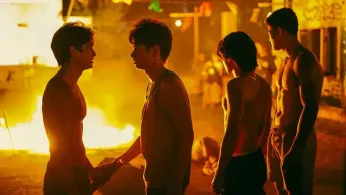
4 hours ago
Brotherhood on the Edge: ‘Some Nights I Feel Like Walking’ Illuminates Queer Lives in Manila’s Neon Shadows
READ TIME: 3 MIN.
In the heart of Manila, where danger and tenderness intertwine, Petersen Vargas’s 2024 film "Some Nights I Feel Like Walking" follows a group of young gay street hustlers bound together by circumstance and forged by adversity. The film opens with a chance encounter between Uno, a streetwise hustler, and Zion, a troubled teenager, at a busy bus terminal. Their fleeting connection sets the stage for a story that, two years later, will see them reunited under far grimmer circumstances: both hustlers booked by the same client on a night that changes their lives forever .
Tragedy strikes when Uno’s close friend, Miguelito, is found dead from an overdose. With the revelation of Miguelito’s dying wish—to be taken home—the group is thrust into an unexpected odyssey. Uno, Zion, and their companions Bayani and Rush embark on a journey that will take them from the bustling streets of Manila to the rural provinces, all while carrying Miguelito’s body with them. Along the way, the boys confront the harsh realities of their existence, their vulnerabilities laid bare as they navigate grief, violence, and the search for belonging .
"Some Nights I Feel Like Walking" is not merely a gritty exposé of sex work; it is a meditation on the power and necessity of chosen family in queer life. While the film never shies away from the realities faced by Manila’s young hustlers, it focuses with compassion on the brotherhood that emerges among the group. For many queer youth, especially those estranged from biological families or displaced by circumstance, the bonds forged in adversity become lifelines .
Director Petersen Vargas draws deeply from his own experiences walking the streets of Manila as a young queer person, infusing the film with authenticity and intimacy. The story’s personal roots underscore the film’s central themes: queer desire, the search for acceptance, and the bittersweet victories of survival in a world that often refuses to see marginalized youth. The characters’ journey is marked by moments of solidarity and vulnerability, revealing that in the absence of societal support, queer individuals often find strength and family in one another .
With a cast led by Miguel Odron (Zion), Jomari Angeles (Uno), and Gold Aceron (Miguelito), the film avoids stereotypes, presenting its protagonists with nuance and humanity. The depiction of queer Filipino youth—often invisible in mainstream media—resonates especially during its Philippine premiere this Pride Month, affirming the film’s commitment to visibility and empowerment .
The cinematic style, praised for its neon-lit portrayal of Manila’s underbelly, reflects the tension between hope and despair that pervades the hustlers’ lives. The screenplay, also by Vargas, offers moments of humor and tenderness amid the harshness, inviting viewers into the emotional world of its characters. Producers Stefano Centini, Alemberg Ang, and Jade Castro, along with co-producer Anthony Chen, have helped shape a film that stands out in the international queer cinema landscape .
"Some Nights I Feel Like Walking" has premiered at several LGBTQ+ film festivals, including XPOSED Queer Film Festival Berlin, OUTshine LGBTQ+ Film Festival, and Frameline49, inviting global audiences to witness a narrative rarely told on screen. Its themes—death and grief, violence and self-injury—are accompanied by a message of resilience and solidarity. The film’s depiction of queer Filipino youth grappling with neglect and hardship is a call for recognition, compassion, and change .
By centering queer lives in Manila’s margins, Vargas’s film disrupts dominant narratives and foregrounds the voices of those most often silenced. It is a celebration of queer resilience, an affirmation of the necessity of chosen family, and a testament to the power of storytelling as a tool for survival and connection.
As Pride Month unfolds, "Some Nights I Feel Like Walking" stands as a cinematic invitation to recognize the beauty and complexity of queer existence—especially for those who, despite the odds, keep walking together into the night.






